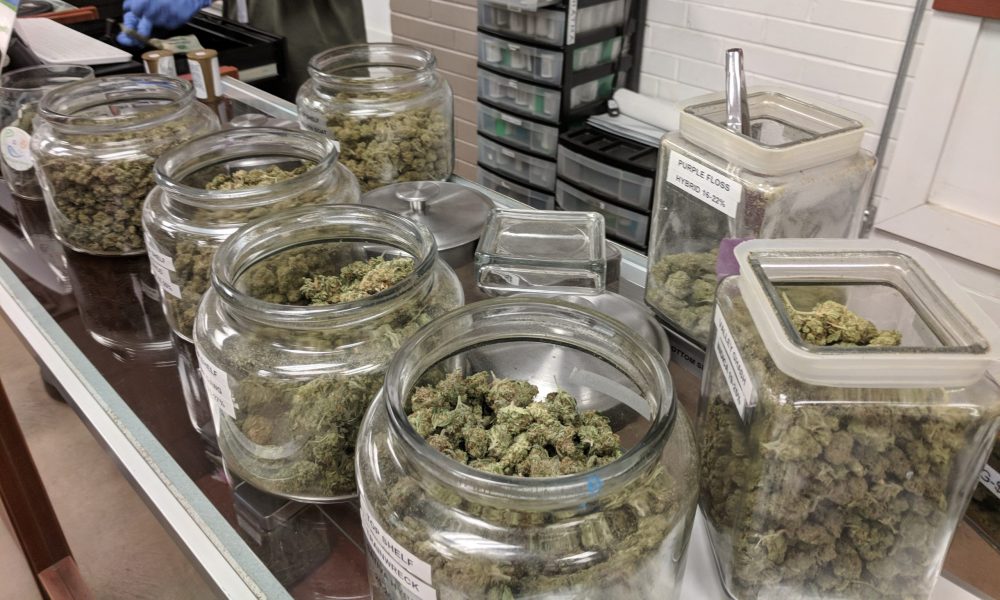As New York works to significantly expand the state’s regulated marijuana market, a new bill would empower individual municipal governments to shut down unlicensed cannabis businesses and seize their products.
The legislation from Assemblymember Jenifer Rajkumar (D) aims to address the proliferation of illegal operators that have emerged throughout the state amid the protracted rollout of New York’s legalization law.
Currently, state regulators with the Cannabis Control Board (CCB) hold enforcement authority to close unlicensed businesses. The newly filed Stop Marijuana Over-proliferation and Keep Empty Operators of Unlicensed Transactions (SMOKEOUT) Act would expand that authority to local governments by giving municipal officials the power to “order the immediate closure of any business” found to be illegally marijuana and to seize its merchandise.
“The lack of authority for municipalities to interdict unlawful retailers, combined with limited resources from the Board, has resulted in the proliferation of so-called ‘smoke shops’ openly selling illegal, unregulated cannabis and other contraband with near total impunity,” a justification memo attached to the bill says.
“The vast amount of contraband and loose cash in these smoke shops have made them tantalizing targets for robberies and hotbeds of crime. This has put communities, shop employees, and their customers in extreme danger,” it says. “These shops are also unfair competition to licensed dispensaries, who cannot afford to sell their rigorously tested and regulated cannabis at the prices smoke shops offer.”
The bill’s introduction comes as New York regulators move to process hundreds of marijuana business license applications. Over a dozen new cannabis retailers opened in December alone following a settlement agreement lifting an injunction that had imposed a months-long licensing blockade.
“Our top priority is to grow and expand New York’s legal cannabis industry while cracking down on the illicit storefronts that continue to plague communities,” Gov. Kathy Hochul (D) had said at the time.
In October, the New York Senate Cannabis Subcommittee, which was established in April and is being chaired by Sen. Jeremy Cooney (D), heard from witnesses and discussing potential legislative solutions to the state’s ongoing cannabis legalization implementation problems.
Meanwhile, an end-of-year report from New York’s Office of Cannabis Management (OCM) found that consumers purchased more than 3.5 million marijuana products during 2023. Once December figures are tallied, total sales for 2023 are expected to exceed $150 million.
In terms of enforcement against unlicensed marijuana activity, the state seized 11,600 pounds of illicit products worth an estimated $56 million, OCM said in the report. They also performed 369 “enforcement inspections” of illicit operations.
—
Marijuana Moment is tracking more than 900 cannabis, psychedelics and drug policy bills in state legislatures and Congress this year. Patreon supporters pledging at least $25/month get access to our interactive maps, charts and hearing calendar so they don’t miss any developments.
Learn more about our marijuana bill tracker and become a supporter on Patreon to get access.
—
Meanwhile, the state’s Department of Labor last month published dozens of sample job descriptions for positions in the legal industry, which officials said are intended to help companies streamline hiring processes and allow prospective employees to assess their qualifications to work in various roles within the emerging cannabis industry.
Hochul, meanwhile, signed legislation in November that attempts to make it somewhat easier for financial institutions to work with state-licensed cannabis clients. She also signed a separate bill that’s meant to provide tax relief to New York City marijuana businesses that are currently blocked from making federal deductions under an Internal Revenue Service (IRS) code known as 280E.
While Hochul signed an earlier budget bill in 2022 that included provisions allow state-level cannabis business tax deductions—a partial remedy to the ongoing federal issue—New York City has its own tax laws that weren’t affected by that change. The new measure is meant to fill that policy gap.
Hochul also recently vetoed legislation that would have allowed hemp seeds to be included in animal feed for pets, horses and camelids such as llamas and alpacas.
In September, 66 state lawmakers—about a third of the entire state legislature—also wrote to Hochul urging her to sign a bill that would allow licensed marijuana producers to sell products to tribal retailers. The plan would offer a release valve to hundreds of cannabis farmers who are currently sitting on surpluses but have no place to sell their products. Last month, however, Hochul vetoed that bill.
State regulators are also working to debunk what they say is the “false” narrative that cannabis is commonly contaminated with fentanyl—a “misconception” that remains “widespread” despite a lack of evidence. OCM recently put out a factsheet on the issue, acknowledging that while fentanyl has been found in drugs like MDMA and heroin, anecdotal claims about marijuana laced with the potent opioid are so far unfounded.
The state’s Office of Addiction Services and Supports (OASAS) also recently revised guidance around THC testing for people in treatment for substance use disorder, advising marijuana screening only in cases where “the patient has identified a reduction in, or cessation of cannabis as part of their treatment goals.”
In November, on the post-Thanksgiving Black Friday, regulators encouraged people to take advantage of the deals and support small businesses by shopping for cannabis at licensed retailers.
More States Set To Legalize Marijuana And Psychedelics In 2024 As Federal Cannabis Scheduling Review Concludes
Read the full article here

